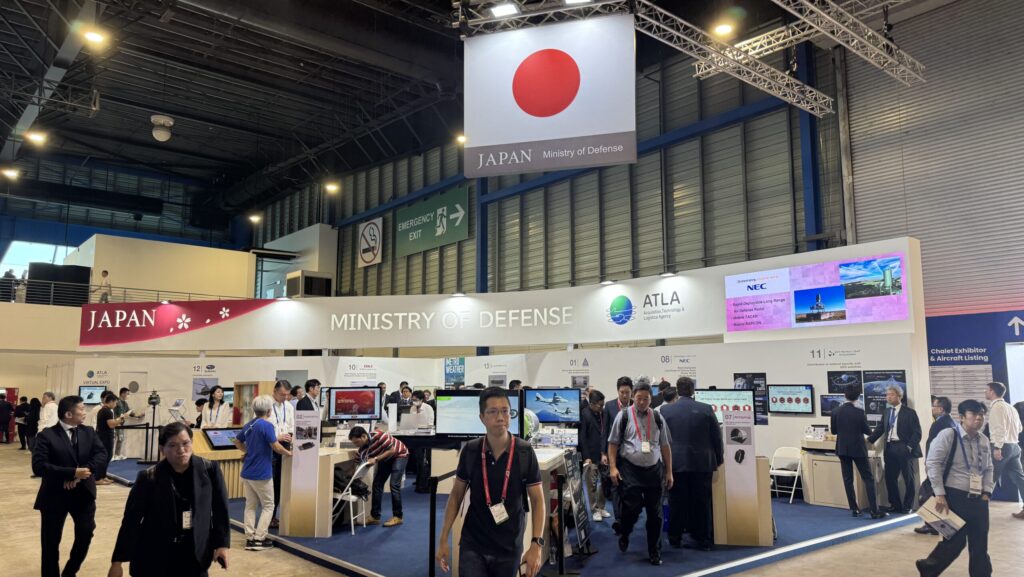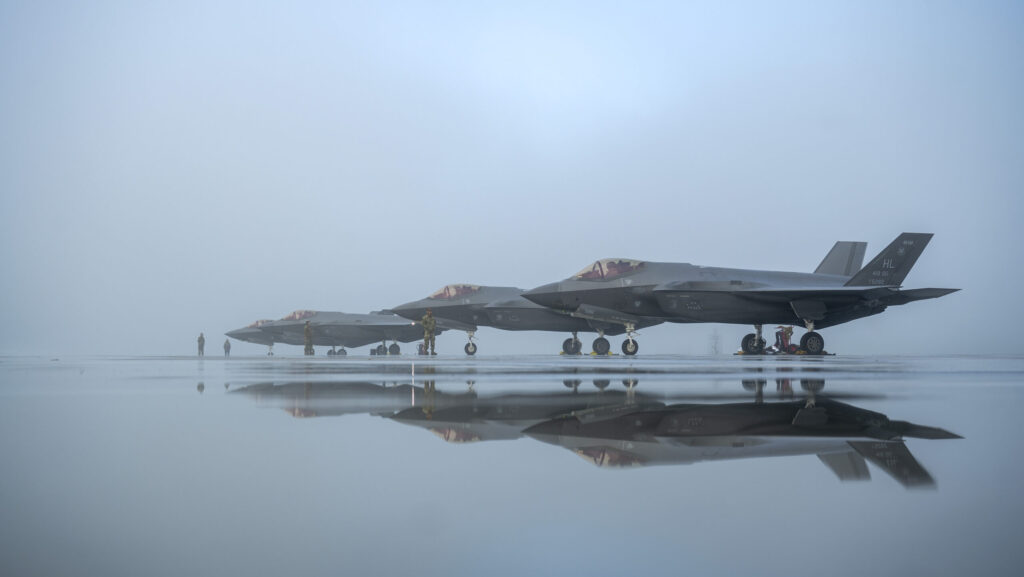The Japanese Defense Ministry made its first appearance at the 2024 Singapore Airshow, hoping to boost arms exports and encourage Japanese small and medium enterprises. (Colin Clark/Breaking Defense)
SINGAPORE AIRSHOW — In a clear sign that Japan is trying to build an arms export business after decades during which such sales were banned, the Japanese Defense Ministry is displaying at a foreign airshow for the first time.
Japan’s defense acquisition agency also brought 14 companies here to showcase their products and meet possible customers, Hideki Fukawa, director of the ministry’s Defense Equipment Cooperation Planning Office, told Breaking Defense.
“The Singapore Airshow is one of the biggest airshows in this region and Singapore is a very important partner for Japan because it is located in the center of the Indo-Pacific region, and the Japanese government wishes to demonstrate a free and open Indo-Pacific region,” Fukawa, whose office is roughly analogous to the American Defense Security Cooperation Agency, said while dozens of people checked out the Japanese offerings.
The phrase “free and open Indo-Pacific,” of course, is used by the US and its partners to represent standing up to China’s ambitions across the South China Sea and its belligerent treatment of Taiwan. In its 2021 Defense White paper, Japan declared for the first time that the stability of Taiwan is a key Japanese interest.
Japan eased its arms export regulations at the end of last year to allow the transfer of lethal weapons, but there has been little public news around sales — something several members of the Japanese delegation said was due to a combination of Japan’s conservative culture and the very newness of the changes Japan did agree to give the Philippines a radar worth an estimated $4 million last November, but it was not a sale.
The companies here include a startup building an artificial intelligence edge computing chip called EdgeCortix. It’s based in Japan, but as with many tech startups, its employees come from many countries. Stan Crow, a former US Defense Department tech expert, is their vice president for defense and space technology. Notably, Crow said, the Japanese government reached out to his company and invited them to Singapore — a clear sign of the interest Tokyo has in building out its defense export business.
The company had on hand one of its chips at its small stand, along with some promotional materials. a Feb. 15 announcement from the company identified the capability as the SAKURA-I chip, which is described as EdgeCortix’s “flagship” product.
Subaru, the giant Japanese car company, came to boost the export potential for it UH-2 helicopter. The Japanese military plans to buy more than 100 of the aircraft, which had its maiden flight in 2022, but there haven’t been any foreign buyers yet. Fujita Yasunori, manager for defense helicopter sales for the company, said Taiwan, Australia and America, among others, had expressed interest.
Metro Weather America Inc., sells very small Doppler-Lidar wind monitors. They fit in a parking space and can detect wind shear as well as monitor weather for up to 30 kilometers. The company was a last-minute addition to the companies heading for Singapore, CEO Junichi Furumoto said, who added the firm has fielded inquiries from three countries, including the United States.
A survey of the 14 companies by Breaking Defense found that, through the three days of the conference, most had heard from three to five prospective customer countries. The most common were the US, Taiwan, Indonesia and Malaysia.
The other companies included:
- Asahi Metal Industry, which produces aircraft composite parts
- Jupitor Corporation makes a medical trauma treatment center in a container to be deployed on C-130 Hercules or C-2 Greyhounds
- NTKJ provides “high precision” optical lenses and mirrors
- NEC Corporation builds and sells a deployable long-range air defense radar, as well as two other radar systems
- Oki Electric Industry, which makes cockpit displays
- Kawasaki Heavy Industries, the producer of P-1 maritime patrol aircraft, C-2 transport aircraft and turbofan engines
- Kurimoto, who does metal additive manufacturing for engine parts
- SKY Perfect JSAT, a satellite communication service
- Takagi Steel provides metals for aircraft
- Japan Radio Co., which produces a portable tactical radio that can handle push-to-talk and video streaming
- Mitsufuji creates electromagnetic and fire resistant woven material for a hangar to shield electronics from EMP and other interference. They also market a wristband device to detect heat stroke





















Discussion about this post